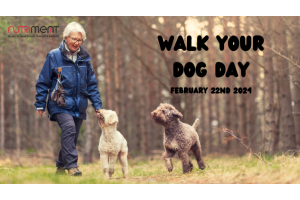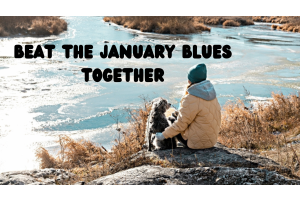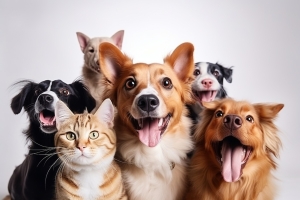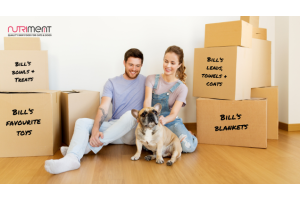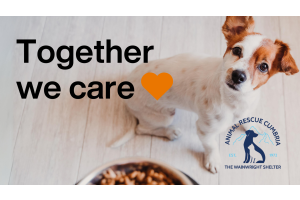Excited Wee... Or Appeasement Behaviour?
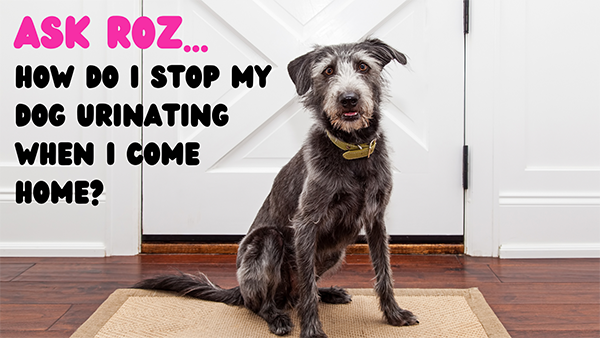
You asked: “Why does my dog wee when they greet myself or my guests when we come home, or when they meet unfamiliar people? How do I stop them doing it?”. Here Roz Pooley, Canine Behaviourist from The Mutty Professor, answers your question!
It can be embarrassing when dogs urinate as they greet people, especially if the urine goes all over the person! It can also be frustrating to constantly have to clean up after them.
This behaviour is often termed ‘excitement weeing’. However, this isn’t a particularly helpful label, as it gives the impression the dog is happy, which may not always be the case. Another term used is ‘submissive urination’, which is a little more accurate. Although, in clinical animal behaviour we tend to prefer the word ‘appeasement’ to ‘submissive’.
Appeasement Behaviour
Appeasement behaviour is the term used to describe a range of non-aggressive behaviours used to diffuse a threat. Examples of appeasement behaviour include licking the face, rolling over and a lowered body with excessive bending from side to side.
It's often observed in young, less confident, conflict-avoiding individuals who are still highly social, actively seeking interactions, but who can become anxious during that interaction.
What’s often confusing for owners and people is when dogs roll over. More often than not, when in an active/awake state (as opposed to relaxed and sleepy) this is NOT a request for a belly rub, but an appeasement gesture that says “please don’t hurt me!”.
This is where things can get very confusing! Because you’d think a dog who is worried about human interaction would not approach- but this isn’t the case. Most dogs who do a lot of appeasement behaviour are highly social, but conflict-avoiding. This means they get anxious about conflict and use appeasement behaviour to try and avoid being on the receiving end of aggression.
When appeasement behaviour is given, and the recipient does not respond by increasing distance or softening their body language, things can escalate. Anxiety and arousal may increase and we can then see accompanying behaviours- including urination.
Let’s put this into context….
A social, young puppy is greeting a person who interacts with them in an excited manner. The puppy starts to offer appeasement behaviour, such as rolling over onto their back, but the person starts to tickle their belly, unaware that rolling over is a sign of low confidence in that moment. The puppy’s anxiety and arousal increases, and they then urinate.
But, why the urination?
There is no conclusive answer, and it may vary from dog to dog! What we do know is that dogs can urinate and defecate when they are in a high state of stress and that there are pheromones (chemical messages) and general information about their health in their urine. They could be urinating because they lose control in that moment or they could be volunteering information by urinating.
Whether the urination is intentional or not will likely depend on the dog and the context, but my observations are that this behaviour in this context is more often not fully under the dog’s control, because they are in a higher state of stress and arousal.
Before you object and tell me your dog LOVES greeting you and visitors, it’s important to acknowledge that stress can be positive and negative with regard to the emotions experienced. It is possible for positive stress (excitement) to reach high levels that start to have a greater effect on the dog’s fight or flight system (the sympathetic nervous system). In other words, even too much excitement can be a bad thing!
If you’re returning from some time away from home, it is also possible your dog has a full bladder, that they just cannot hold onto when excited.
How do I know if my dog is negatively stress or not?
By reading their body language you can start to understand whether your dog is negatively stressed (anxious or fearful) or positively stressed (intensely excited). With anxiety, you will generally see body positioning close to the ground, and their movement will be very stop-start or all over the place as if they aren’t sure what to do. This can even include jumping up, which can make it seem like they are excited.
If they’re excited you’ll see a more neutral body position (standing upright) and perhaps your dog will jump up at you.
So, how do I stop them urinating?
As we are dealing with a potentially involuntary response (urinating) to a situation, the solution lies within looking at what elevates the dog’s behaviour. More often than not, that is the person’s interaction or the dog anticipating certain behaviour from the owner, due to previous experiences.
We see this happen a lot with dogs who urinate during greetings. They have had so many repetitions of over-excited interactions, that they urinate before physical contact has been made. This is an example of a conditioned emotional response, where cues associated with greeting someone elicits physiological changes which influence behaviour.
Reviewing how the humans involved behave is the main solution. A hands-off approach to initial greetings can help keep our dogs from becoming overstimulated.
If it’s you coming home, calmly say “hello” to your dog and then slowly walk through to the garden door and let them out so they can relieve themselves. Once your dog has toileted and calmed down, then you can give them physical contact feeling more confident this isn’t going to overstimulate them. If your dog rolls over in a greeting context, withdrawing to allow them space to stand up again can significantly help avoid urinating.
If you are expecting visitors, give your dog something to do- such as a frozen Kong, chew or raw meaty bone so your dog can keep themselves busy as your visitor enters. Your dog may still want to greet the visitor, but having something available to do may help your dog disengage and calm themselves down. Once they have calmed down following the initial excitement of the visitor arriving your dog can interact with the visitor if they both wish to. You can coach your visitor on how to interact with your dog calmly, avoiding tickles, head strokes and excited voices.
When your dog greets people on the street, ask people to initially stay standing so your dog gets time to sniff them should they wish to. Coach people on how to interact with your dog, again avoiding rough-fuss, tickling or excited voices- which is all too easy when dogs themselves are acting in an exciting way. Ask people to calmly stroke your dog on the back- but only when your dog is calm. This may mean that some people don’t get to stroke your dog, and that is not a bad thing! Your dog doesn’t have to be stroked by everyone in order to become socialised or maintain positive experiences with people.
Once your dog learns that interacting with people is a calm experience, they should also start to become calmer around people- familiar and unfamiliar.
It's too easy for people to over-excite dogs in the way they interact, and it’s not overly fair to expect dogs to stay calm in response. More often than not, human and dog behaviour can influence the other- and a vicious cycle is created.
So, should I not stroke my dog’s belly then?
If your dog is relaxing and stretches out next to you, or even lies in the middle of the floor stretched out while making eye contact- this is usually a request for an interaction! The tail tends to not cover the genitals, the body is relaxed and limber, rather than a tucked tail and tense body.
PLEASE NOTE: If your dog seems to persistently urinate in a variety of contexts, despite the above being put into practice, it is sensible to take them to your veterinarian for a check-up, as they may have a urinary tract infection.

